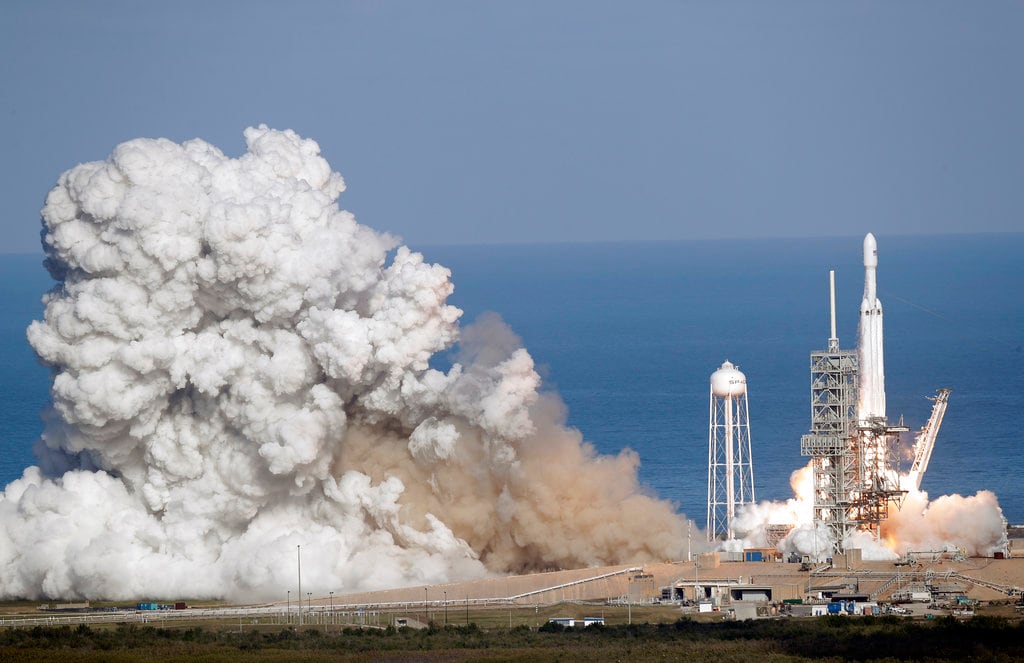WASHINGTON — If President Donald Trump wants his proposed Space Force to have a life beyond a campaign rally applause line, his administration will have to win over skeptics in both parties, especially in the U.S. Senate.
When Vice President Mike Pence laid out plans last week for a new space-focused military branch to be created by 2020, the White House had not obtained buy-in ahead of time from two key constituencies: the Senate’s Republican leaders and members of the Senate Armed Services Committee.
“Traditionally, this has been a role played by the Air Force, and I’ve not yet heard a compelling case why we need a separate force,” Senate Majority Whip John Cornyn, R-Texas, told reporters Aug. 16. “Maybe there is a case to be made, I just haven’t heard it yet.”
At Trump’s behest, Pence proposed a new branch be created from existing space-focused elements in the military as part of the 2020 budget cycle and announced the Pentagon will get the ball rolling with or without Congress to build a new space operations force and fast-track space acquisitions organization.
The White House contends it is working with lawmakers on the relevant committees, and at least one of them, House Armed Services Strategic Forces Subcommittee Chairman Rep. Mike Rogers said he has spoken by phone with Trump. Rogers, R-Ala., led the effort in Congress last year create a space corps, subordinate to the Air Force.
Two House Republican leaders — Majority Leader Kevin McCarthy of California and GOP Whip Rep. Steve Scalise of Louisiana — are backing Trump’s proposed Space Force, the Associated Press reported Aug. 16. The two are lead contenders to become House speaker when Rep. Paul Ryan, R-Wis., retires at the end of his term in January.
The argument for a Space Force is that Russia and China have anti-satellite technologies that endanger the space-based assets America depends upon for indispensable intelligence, surveillance communications and navigation capabilities. For decades, the United States treated space as a peaceful domain and seeded it with unprotected assets — and now it needs to go big, with a dedicated organization to establish American military dominance in space, the argument goes.
“President Trump has pulled the lever to do this, DoD has built the plans to do this, and the thing for us to do is not throw rocks but say this is leadership taking us in a new direction,” said Senior Research Fellow for Defense Policy John Venable, of the conservative Heritage Foundation. “It won’t hurt us, it will only help us. It may cost us a little more in the process.”
Space Force has generated plenty of headlines in recent weeks, but whether the administration has effectively communicated its arguments to lawmakers and the public yet is a separate question.
According to two recent polls, space fever isn’t yet an epidemic. Per one CNN poll, a majority of Americans (55 percent) say they don’t support the new plans to establish a Space Force; only 37 percent said they do. A separate Economist/YouGov poll found only 29 percent of Americans thought the Space Force was a good idea; 42 percent thought it was a bad idea, and 29 percent were on the fence or expressed some other opinion.
RELATED

The powerful Senate Appropriations Committee chairman, Sen. Richard Shelby, R-Ala., said that while space is important and he’s open to persuasion, the administration has not adequately made its case.
“My concern might be satisfied with, you know, information, but do we need to create another Air Force, Army, Navy, Space Force, and will that be another bureaucracy? Will that help us do things that we can’t do within the Air Force?” Shelby said. “I don’t know those answers.”
Members of Senate Armed Services Committee — whose jurisdiction over military policy makes it a key gatekeeper for a new service — this week expressed varying degrees of skepticism.
SASC Ranking Member Sen. Jack Reed said he favors bringing military space assets together but held fast to his opposition to a new service. That could make him a major obstacle to any effort to make the proposal part of the 2020 defense authorization bill.
“I think the concept itself is not the right direction,” said Reed, of Rhode Island. “We have models that work very well in terms of joint and unified commands. We don’t need a specialized force with all of the bureaucracy, all of the trappings.
SASC Strategic Forces Subcommittee chairwoman Sen. Deb Fischer, R-Neb., last year openly opposed the House’s effort to create a space corps. She appeared to soften her language somewhat this week, but it seemed clear the White House had not sought her out.
“I’m looking forward to hearing more details,” Fischer said. “I need to hear from the [Defense] Department about how they plan to implement this and if we have personnel available in order to fill those positions.”
Sen. Dan Sullivan, R-Alaska, and a member of the Airland and Strategic Forces subpanels, votes in favor of the president’s positions 93 percent of the time. But he saw this effort as out of step with the push from Congress and the Pentagon to boost military readiness.
“Readiness has plummeted of the five services—plummeted,” said Sullivan, a Marine Reserve officer. “Where I’ve been focused is let’s get the five services we currently have back to the readiness levels the American people think we should have … Once we get there, then we can talk about a space force.”
SASC Emerging Threats and Capabilities Chairwoman Sen. Joni Ernst, R-Iowa, was convinced threats in space needed to be taken seriously, but she was concerned a reorganization would be the wrong answer.
“There is a need for this. We just need to figure out the most efficient way to deliver on this project, whether its part of the Air Force,” said Ernst, a former Iowa National Guard officer. “How do we protect tax payer dollars and make sure they’re most efficiently used to achieve the objective.”
High-profile South Carolina Republican Sen. Lindsey Graham said he was, “open-minded” to a Space Force. Still, the administration’s announcement left him with questions.
“I mean do we really need another branch of the [military]? What would be the benefits of having a separate branch?” said Graham, a SASC member. “Can you do it within the existing military structure? I’d be curious to see what the military says about this.”
RELATED

Democrats, who have less to lose by alienating the White House, voiced sharper criticism and highlighted a weakness in the messaging: Pentagon leaders for the idea lately appeared to be against it earlier. (Defense Secretary Jim Mattis, who last year opposed moves in Congress to create a separate space service, defended the reversal this week.)
“I don’t believe that they have changed their minds about it,” New Hampshire Sen. Jeanne Shaheen, a SASC member and lead appropriator, said of military leaders. “I think there are people in the White House who have pushed them to change their minds, but I think the facts on the ground have not changed in the last year to suggest to me we should take a different action.”
Democrats said the White House’s roll-out last week without widespread engagement on Capitol Hill was typical of this administration.
Virginia Sen. Tim Kaine, dubious of the idea and that it was achievable by 2020, called Pence’s announcement light on details, “like a brochure.”
“It seems a little fantastical to me, and especially that they hadn’t come and briefed us, ‘Here’s why this is a good idea,’” said Kaine, the top Democrat on SASC’s readiness subpanel. “They’re not taking cyber seriously enough and now they’re going to do a space force. It seemed odd.”
At least one Democrat on the panel who was open to hearing more, Seapower Ranking Member Maizie Hirono, of Hawaii, said she’d been turned off by the administration’s unilateral policy pronouncement.
“I think this is an example of the White House just announcing something without going through what I would call an appropriate discussion about whether or not we should create another force,” Hirono said.
“What I object to more is just the way the president tends to make all these big announcements. And whether or not it will happen, he moves on to the next crisis—which he generally creates himself.”
Joe Gould was the senior Pentagon reporter for Defense News, covering the intersection of national security policy, politics and the defense industry. He had previously served as Congress reporter.







